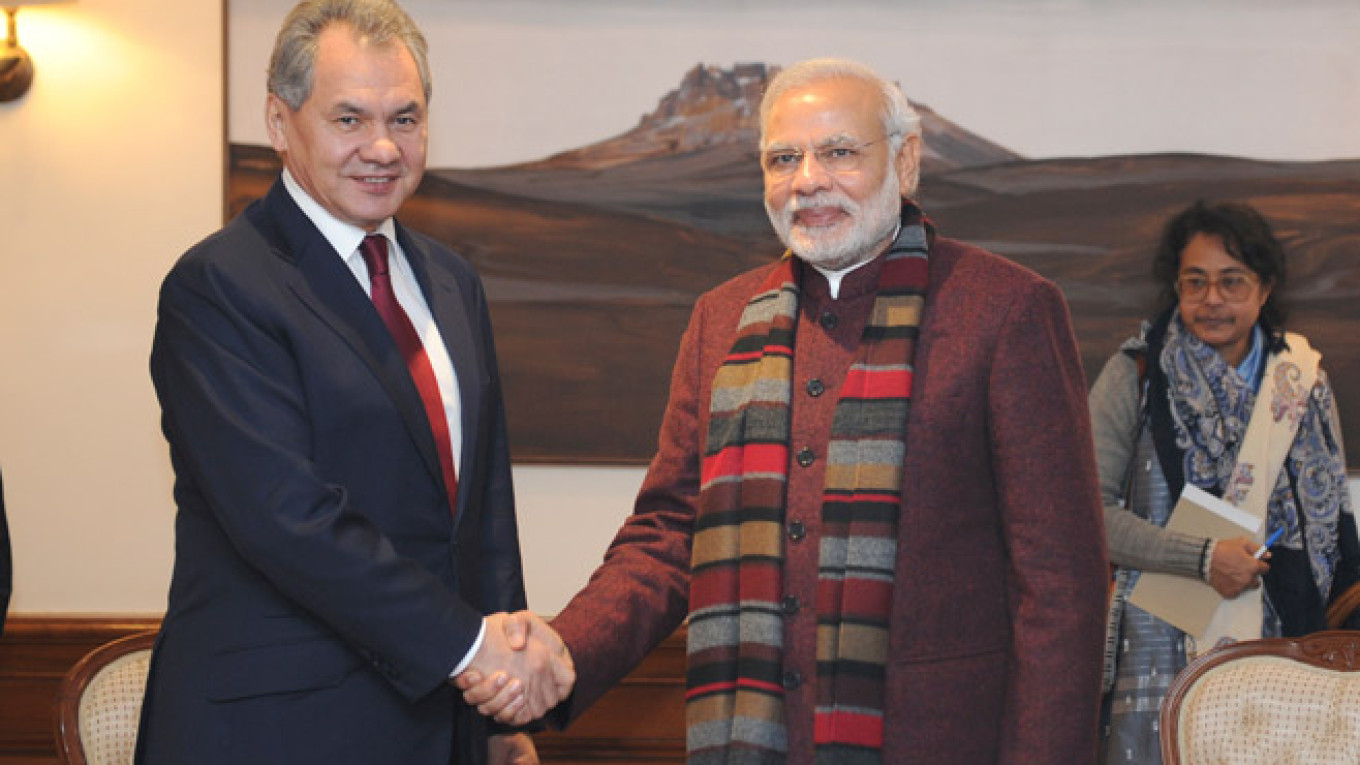Russian Defense Minister Sergei Shoigu on Wednesday met with his new Indian counterpart, Manohar Parrikar, in New Delhi, marking an end to a year of silence on the two countries' myriad cooperative military ventures.
Shoigu's visit marks an expansion of Russia's position as India's largest arms supplier at a time when the U.S. defense industry has targeted New Delhi as a potential source of revenue amid Washington's declining military spending.
India is a key arms export market for Russia: Moscow supplies about 70 percent of New Delhi's military equipment, with sales amounting to $3.8 billion last year, according to the Stockholm International Peace Research Institute.
The relationship has stalled over the past year, however, as former Indian Defense Minister Arun Jaitley split his time between duties as both defense and finance minister until Parrikar's appointment in November.
Although many details of the day's discussions have not been publicized, a flurry of Russian media reports cataloging new and forthcoming agreements between Russian and Indian defense firms indicate that the two sides were able to make headway.
Russia has agreed to supply a wing of MiG-29 fighter jets and Ka-31 helicopters to outfit India's first domestically designed aircraft carrier, the Vikrant, news agency RIA Novosti reported. Russia will continue to service the planes and help keep the Vikrant in working order.
Shoigu also took steps to ensure there is no future lull in contact between the Indian and Russian defense ministries, which are often called upon to facilitate the signing and execution of arms contracts and joint development projects.
The two defense ministers have agreed to set up a telephone "hot line" with quarterly conference calls to ensure that projects are progressing on schedule.
The most high-profile of these projects is the joint development of Sukhoi's PAK FA fighter jet, which Russia and India hope will rival the United States' F-22 and F-35 stealth fighters.
The project has recently been marred by friction, with India complaining that Russia is not making enough progress on the fighter's $10 billion design. Jane's Defence Weekly reported in September that the Indian Air Force had reduced the number of PAK FA fighters it intends to buy from 220 to around 130 to 145 following clashes over the direction of the project.
Russia has meanwhile demanded more time and an additional $1 billion for the fighter's development.
India has also complained that Moscow is not sharing all information, despite India's equal financial stake in the project. Shoigu appears to have addressed this point during his visit: The ministers agreed to share all information concerning problems and accidents involving Russian aircrafts operated by both militaries.
In order to defend Russia's position, Shoigu will have to take care to ensure that dialogues continue across all levels of the military and military-industrial partnership, Pyotr Topychkanov, an expert in Russia-India relations at the Carnegie Moscow think tank, told The Moscow Times
"Future progress will depend on the ability of both countries to have permanent dialogue, invest in their relationship, and to spend their resources — human, scientific, etc. — on their bilateral projects," he said.
A Message from The Moscow Times:
Dear readers,
We are facing unprecedented challenges. Russia's Prosecutor General's Office has designated The Moscow Times as an "undesirable" organization, criminalizing our work and putting our staff at risk of prosecution. This follows our earlier unjust labeling as a "foreign agent."
These actions are direct attempts to silence independent journalism in Russia. The authorities claim our work "discredits the decisions of the Russian leadership." We see things differently: we strive to provide accurate, unbiased reporting on Russia.
We, the journalists of The Moscow Times, refuse to be silenced. But to continue our work, we need your help.
Your support, no matter how small, makes a world of difference. If you can, please support us monthly starting from just $2. It's quick to set up, and every contribution makes a significant impact.
By supporting The Moscow Times, you're defending open, independent journalism in the face of repression. Thank you for standing with us.
Remind me later.


